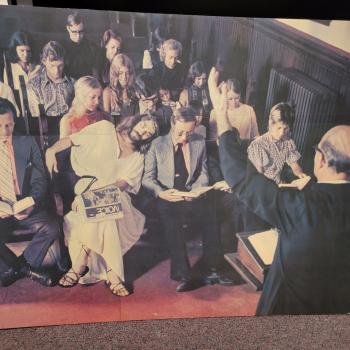This post will be dealing with pp. 1426-43 of the next to last chapter in this epic. Here Tom addresses at some length the ‘identity’ question. Before reading Tom’s critique I would suggest the readers of the blog read first my chapter entitled ‘The Trinity of Paul’s Identity’ in The Paulquest, as background for this discussion. Tom is exercised about the issue of whether and in what sense Paul could be called a Jew, and further, could be called a Torah-true Jew. His main dialogue partners, with whom he disagrees rather strongly in some cases, and very strongly in others (M. Nanos), are those who want to say that Paul remained a Torah true Jew after he embraced Christ. Tom, to give the short answer, says that this will not do. The change in Paul’s life was more radical than that. The issue is made more complex for Tom because he wants to insist on something that Paul himself didn’t insist on— namely that the new covenant is the renewal of the Mosaic covenant, based, again, on Tom’s particular interpretation of Deut. 27-30. It is understandable that when one takes Tom’s position about covenant renewal rather than a new covenant that simply has some points of agreement with the Mosaic covenant, but is not a renewal of it, that he will come under heavy criticism for painting Paul as if he were hopelessly self-contradictory, or a quisling, or deceptive etc.
This charge falls to the ground if Paul in fact has cut the Gordian knot, and simply claims that the new covenant is connected only to the Abrahamic covenant, not the interim arrangement called the Mosaic covenant.
First of all, I agree with Tom that the whole modern discussion of identity in general (and what constitutes it) and Jewish identity in particular is a slippery one. Different scholars have different things to say or emphasize on this subject. In my view, it is a mistake to talk about just the Jewish aspect of Paul’s identity in isolation from the other aspects (his identity in Christ, and less important, his identity as a Roman citizen). But that is a discussion for another day. Tom is concerned about those who want to re-Judaize (if we can put it that way) Paul in various ways.
Tom is right that Paul insists he is a Jew by nature (Gal. 2.15) just as Peter is. Furthermore, both Philippians 4 and 2 Cor. 11 make clear Paul is proud of various aspects of his Jewish heritage, but that same Phil. 4 passage makes clear that he is prepared to reckon even the good thing of his Jewish heritage as ‘skubala’ in order to be ‘found in Christ’. In my view this leads inescapably to the conclusion that Tom intimates in this chapter, namely that Paul also has a new identity in Christ, in addition to his birth identity as an ethnically Jewish person. In other words, he is not simply a Jew, much less a Torah true Jew in the modern or ancient sense of the term, if by Torah true one means someone who keeps the Mosaic law and thinks that that Mosaic covenant is still active and applicable.
One subject that Tom does not broach, that I have discussed with some Jewish friends, is the notion that strictly keeping the sabbath or the food laws or the laws of clean and unclean was not always as big a deal as it is sometimes made out to be. By this I mean that some even very observant Jews, ancient or modern, might well eat some non-kosher food with Gentile neighbors whom they love or respect on a few occasions, or they might well do some work on a sabbath on rare occasion, or they might well allow themselves to become ritually impure on some occasion, and then remedy these things after the fact by a visit to the mikvah or by using other remedies for such violations. In other words, plenty of Jews saw the obligation to love one’s neighbor as one’s self, and to maintain good relationships with neighbors as more important than strictly and always keeping these other Mosaic laws. It was a matter of priorities within the Mosaic Law, and keeping the great commandment, making the main the thing the main thing. This is not because these Jews themselves were careless, or non-observant, or didn’t care about things like food laws. Again it was a matter of prioritizing the things that were said to be priorities within Torah itself.
Tom’s discussion on pp. 1428-30 is largely on target. Anyone who talks about dying to the Law, cannot be said to simply continue to be a Torah observant Jew in the sense he was previously. Here and later in the chapter the critique especially of Nanos is on target. Tom rightly points out that Paul identifies with the strong in 1 Cor. 8-10, not the weak Jewish Christians, though he wishes to protect the conscience of those who have too many scruples. Similarly Rom. 14-15 points in the same direction, and Tom is right that Paul distinguishes himself from ‘the Jews’ or Judeans in 1 Thess. 2.14-15. One has to be very careful is assessing the continuity and discontinuity between Paul’s birth identity and his current identity as a person in Christ.
Again on p. 1430, Tom is right on the mark in saying “the central reason for Paul’s sharp statement about no longer being under Torah were not to do with comparative religion, but with messianic eschatology”. This is exactly right, and the coming of the Messiah was not a minor thing, it was in various ways a game changer. In particular, I would insist it was a covenant changer moment. However I don’t quite think Tom grasps the nettle when it comes to why Saul the zealot changed his mind about violence against fellow Jews who followed Jesus. The reason was not just that Paul repudiate his former zeal which was not according to knowledge. In principle the Mosaic Law made provisions for how to deal with bad or apostate Jews and they were stringent laws. The main reason to change one’s behavior is that Paul discovered: 1) he was actually opposing the new action of the Biblical God in persecuting Christians; 2) the situation had changed in regard to the Law itself. There was now a new covenant which involved a call to non-violence, turning the other cheek, non-resistance, non-retaliation, loving one’s enemies, and so on. It is this change of covenant law that supercedes the Mosaic ‘only an eye for an eye’ or the punishment of the unfaithful. This, Tom does not suss out. Tom is however correct (p. 1432), that Paul believed that Abraham now had only one family, Jew and Gentile united in the Jewish messiah Jesus. HOWEVER, and it is a big however, Paul also believed that God still had invitations out to Jews currently not part of that fellowship, to join the party, and that Jesus intended to do something about this when he returned. Their invitations to the dance had not been canceled by the coming of the Messiah, and the initial rejection of him by most Jews. Here Fredricksen’s two families approach, like the older Gaston two covenants and two peoples approach simply does not come to grips with what Paul actually says and believed and did.
Tom and I would disagree on what he suggests on p. 1433— Paul did not believe he was actually keeping the Mosaic covenant in a new way in following Jesus. He believed that covenant was obsolete, an interim arrangement, and so on. It was Jesus’ death who had finished and fulfilled the requirements of that covenant, and it was now defunct. This of course is precisely what Nanos doesn’t seem to get— the radicality of Paul. Paul is not devious or deceptive or dishonest. He truly believes the Mosaic covenant has had its day and ceased to be. Keeping the Mosaic covenant has fallen into the category of adiaphora. It’s o.k. for Jews to do it, but in the new eschatological situation it’s no longer required, in particular it is not required of Jews who follow Jesus. So Paul is not being disingenuous when he says that for the sake of the love of his countrymen and his desire for them to know the Messiah Jesus, he is prepare to adapt his old pattern of life in respect to those who were still Torah true. This is a missional praxis, and is no different from what I have described above of Jewish behavior going in the opposite direction of accommodation to Gentile neighbors. No different in principle. Alan Segal was right– if you insist that the Mosaic covenant is and always will be binding on Jews, and you try to explain Paul on that basis, then Paul is an apostate. But if instead you agree with Paul’s perspective on the change of covenants and the new eschatological situation, things look very different.
On p. 1435, Tom stresses “Paul firmly expects Gentile converts to live no longer like gentiles in relation particularly to sexual immoralty [and idolatry], that is, he does not insist that they should continue to follow their previous practices! Paul does not say…that Jews and Gentiles should each stick to their respective ways of life. Nor does he say …that Jews are to remain practicing Jews and not live as Gentiles.” Exactly. What he wants of both groups is that they follow the new ways and law of Christ, and among other things that means that he wants practices that bind together the new community, namely for example by eating together and not insisting on kosher food either, but eating whatever comes out of the meat market. This makes as clear as it could be that Paul believes that even for Jews who follow Jesus, the Mosaic demands in regard to food are obsolete, and it’s a mistake to rebuild what the death of Christ tore down— the wall of separation between Jews and Gentiles.
And as Tom says, the root of the problem in Nanos’ reading of Paul (and others like him), is that he doesn’t understand the radicality of Jesus himself. He thinks Jesus simply represents the ideals and promises of the Mosaic covenant and was simply observant of it. This however is not what the Jesus tradition suggests, and it certainly doesn’t explain the strong opposition by various Pharisees and Sadducees to Jesus. Why did they see his teaching and praxis as such a threat? It’s because Jesus did really see himself in a particular messianic and eschatological light which included the announcement of a new covenant, not merely a renewal or reinforcement of the Mosaic one. Jesus, like Paul, was viewed as a bad Jew, based on the assumption that the Mosaic covenant was a permanent and ongoing one, and if the latter was true, then the assessment would be fair. But Nanos doesn’t quite grasp that Jesus and Paul both are claiming ‘new occasions teach new duties’ even to Jews, if they want to embrace their messiah. Let’s be clear— promises to Abraham fulfilled in and through Christ and the new covenant are what Paul is arguing for. What he is not arguing for is the renewal of the Mosaic covenant in Christ. The conclusion on p. 1443 is correct however— Paul will not be seen as slippery or inconsistent or devious or the like if viewed through the lens of eschatological messianism of the sort he and Jesus himself advocated. And Tom is right, this is not about comparative religions issues or discussions. It’s a discussion about whether the eschatological world clock really did start ticking when Jesus came along, and whether a new covenant, a new very Jewish covenant linked to the Abrahamic one, had been inaugurated by Christ, and proclaimed by Paul.

















